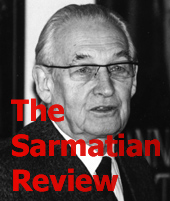| This Issue | Back Issues | Editorial Board | Contact Information |

BOOKS and Periodicals Recieved
April 2003
Volume XXIII, No. 2
Pan od poezji: O Zbigniewie Herbercie, by Joanna Siedlecka.Warsaw: Prószynski i S-ka (02-651 Warsaw, ul. Garazowa 7, Poland), 2002. Photographs, copies of documents, Herbert's own drawings. 427 pages. Hardcover. In Polish.
This book has reached notoriety in Poland. It is an idiosyncratic biography of Poland's most admired twentieth-century poet. As is always the case with remarkable books, it has been dubbed "controversial." Siedlecka drags in some unsavory sidelines of Herbert's biography. Under normal circumstances, that would be nothing new in the world of biography writing, but given the attempts in the 1990s by Adam Michnik's Gazeta Wyborcza to discredit Herbert, any attack leveled at Poland's most admired twentieth-century poet was bound to evoke protests. But the book does not contain anything that could in the long run hurt Herbert's reputation as a poet and as an inveterate anti-communist.
Na linie (On the tightrope), by Piotr Fast. Katowice: Slask Publishers (biuro@slaskwn.com.pl), 2002. 68 pages. Paper. In Polish.
A book of poetry by one of Poland's notable Russicists. Among others, it contains reflection on the business of scholarship writing, and it offers a refreshing perspective on the "little sins" of literary theorists and commentators on literature. The poems on love are delicately crafted. This little volume reminds one of the split personality which afflicts numerous academics. In their professional lives they inhabit the rarefied heights of literary theory, but in their private lives they keep rediscovering basic and simple meanings of words.
Bliskie czytanie: interpretacje literatury XX wieku (Close reading: interpretations of twentieth-century literature), by Piotr Luszczykiewicz. Kalisz: Wydawnictwo Sztuka i Rynek (sztuka@zse.kalisz.pl), 2002. 173 pages. Paper. ISBN 83-913102-8-0. In Polish.
This book is worth noting for several reasons. First, it contains perceptive reflections on major writers and poets of the twentieth century: Tadeusz Rozewicz, Zbigniew Herbert, Tadeusz Konwicki, Stanislaw Lem, Boguslawa Latawiec, K. I. Galczynski, Iosif Brodsky, Seamus Heaney, Wislawa Szymborska, Julia Hartwig, Adriana Szymanska, Stanislaw Grochowiak, Jacek Lukasiewicz, Stanislaw Baranczak, and others. Second, it was published in a small Polish city, Kalisz (pop. 100,000), thus suggesting that Poles are successfully overcoming the kind of centralization from which the French suffer: in France, everything of note seems to be happening in Paris. Luszczykiewicz's collection of essays is first rate, and it reads exceptionally well. If the general reader is ever to return to commentaries about literature provided by professional critics, Luszczykiewicz should be credited with helping the process along. Like Viktor Pelevin with regard to post-Soviet Russian literature, Luszczykiewicz may well be one of those who brought new readers to postcommunist Polish literary criticism.
Other Books Received:
Bibliini siuzheti i motivi v ukrainskii poezii XIX-pochatku XX stolittia, by Irina Vetko. Zielona Góra-Kyiv, 1999. 160 pages. Bibliography. Paper. In Ukrainian. A scholarly study of Biblical motifs in Ukrainian literature of the late nineteenth and early twentieth centuries. The author teaches Ukrainian literature at the University of Silesia, Poland.
Kultura polska: Silva rerum, edited by Romuald Cudak and Jolanta Tambor. Katowice: Slask Publishers (biuro@slaskwn.com.pl), 2002. 276 pages. Bibliography, illustrations. Paper. In Polish.
A good textbook on Polish culture for beginners. Suitable for those members of Polonia who know "children's Polish" and would like to get some lively and well-presented information about Polish history, social culture, literature, and cuisine (as reflected in literature). The authors of the twelve chapters are university professors who know how to negotiate the differences between scholarship and popular writing without compromising either.
Wczesna twórczosc Josifa Brodskiego, by Joanna Madloch. Katowice: Slask Publishers, 2000. 160 pages. Bibliography of Josif Brodsky's early works. Paper. In Polish.
This book appeared in a series associated with Przeglad Rusycystyczny, a Polish scholarly journal dealing with Russian literature. The author concludes that Josif Brodsky's early works differ dramatically from the late ones, in that they reflect Brodsky's efforts to distance himself from personal poetry and concentrate on the craft of poetry. In his Nobel speech Brodsky said, "Esthetics is the mother of ethics." While not negating the value of ethics, in his early poetry Brodsky seems to have believed with Dostoevsky that "beauty [might] change the world."
Homo transcendens w swiecie Gombrowicza, by Edward Fiala. Lublin: Wydawnictwo KUL, 2002. 289 pages. Index of names. Paper. In Polish.
The author analyzes Gombrowicz's world from a psychological and anthropological point of view, showing that his characters transcend all bounds and limits. (mjm)
Male prozy biblijne. Selected by Maria Jasinska-Wojtkowska and Maciej Nowak. Introduction and commentary by Maciej Nowak. Lublin: Wydawnictwo KUL, 2002. 441 pages. Paper. In Polish.
A selection of stories inspired by the Bible and authored by Janusz Korczak, Jerzy Zawieyski, Roman Brandstaetter, Gustaw Herling-Grudzinski and other Polish writers of the twentieth century. (mjm)
Czlowiek i cierpienie w poezji polskiego baroku, by Danuta Künstler-Langner. 2d edition. Torun: Wydawnictwo Uniwersytetu Mikolaja Kopernika, 2002. 185 pages. Summary in English. Paper. In Polish.
This study deals with religious approaches to unjust suffering and spiritual pain. The author analyzes the theodicy of Job, passion poetry, and works about human progress to eternity. (mjm)
Back to the April 2003 Issue
The Sarmatian Review
sarmatia@rice.edu
Last updated 4/30/03